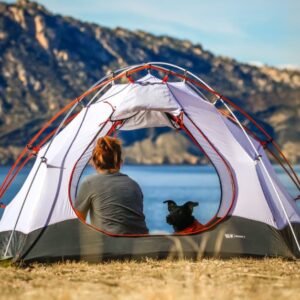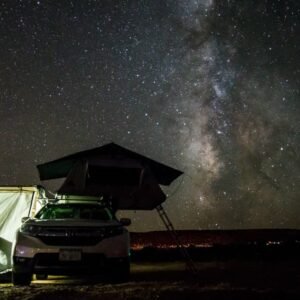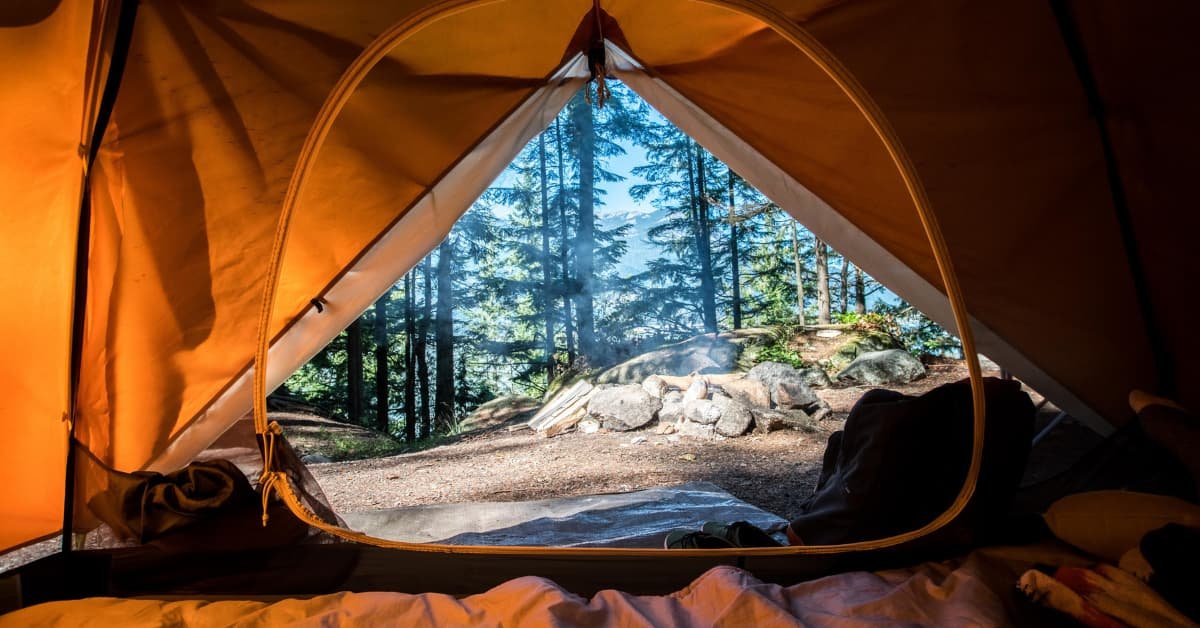
Family camping is a great way to spend quality time with loved ones while enjoying the beauty of nature.
However, it can be expensive to purchase or rent all the necessary gear and pay for campsite fees.
Fortunately, there are ways to save money and still have a fantastic camping experience.
In this article, we will explore tips and tricks for family camping on a budget, including finding affordable campsites, borrowing or buying used gear, and preparing and packing food ahead of time.
Short Summary
- Finding a local campsite and taking advantage of campground amenities can save money on gas and expenses.
- Borrowing or buying used camping gear during seasonal sales can be a cost-effective option for essential gear like tents, sleeping mats, bags, blankets, and pillows.
- Packing and preparing food ahead of time, cooking with mismatched supplies from thrift stores, and stocking up on staples when on sale can help save money on food expenses while camping.
- Bringing outdoor games, cards, and games for playing around the campfire, as well as taking advantage of free activities like hiking, swimming, and singing around the campfire, can provide family-friendly entertainment while camping without breaking the budget.
Location and Amenities
Local campgrounds, such as state parks or private campsites, offer a cost-effective alternative to national parks, which often charge higher admission fees and require long-distance travel.
Moreover, local campsites typically have a range of amenities that can help families save money while enjoying their camping experience.
These amenities may include access to clean water, electricity, restrooms, and picnic areas.
When choosing a campground, families should also consider the difference between camping in a designated campground versus camping in the backcountry.
While backcountry camping may be a more authentic and immersive experience, it also requires specialized equipment and a higher level of expertise.
In contrast, designated campgrounds provide families with a range of amenities that can enhance their camping experience, such as campfire rings, grills, and picnic tables.
Furthermore, camping in a designated campground may also provide families with a sense of safety and security, as they are surrounded by other campers and park rangers who can help in case of an emergency.
Ultimately, the choice between camping in a designated campground versus camping in the backcountry comes down to a tradeoff between cost and convenience, as well as personal preferences.
Gear Essentials
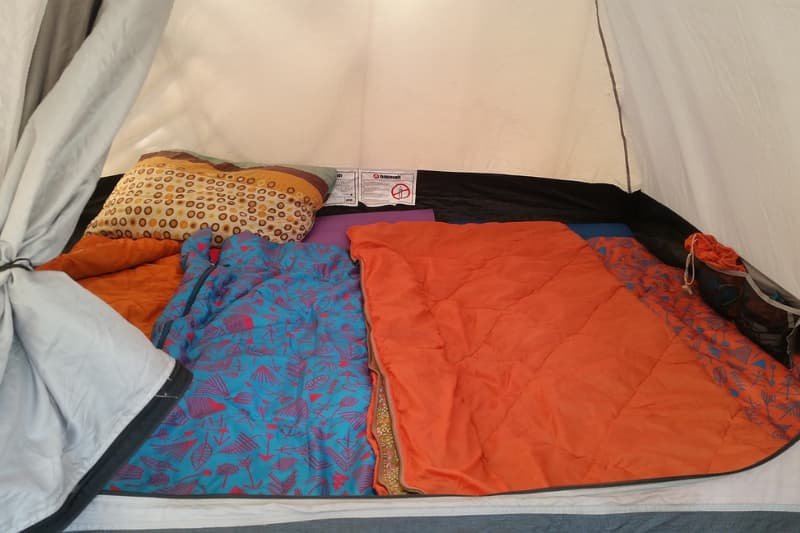
Essential gear for a camping trip includes a tent, sleeping mats, sleeping bags, blankets, and pillows, all of which should be chosen with durability and comfort in mind.
Investing in high-quality gear can be expensive, but there are affordable options available.
When choosing a tent, consider the size and weight, the material and waterproofing, and the ease of setup.
Sleeping mats should provide insulation and cushioning, and sleeping bags should have a temperature rating appropriate for the expected weather conditions.
Blankets and pillows can add extra comfort, but should also be lightweight and easy to pack.
To save money on gear essentials, consider borrowing or buying used equipment, or buying during seasonal sales.
Mismatched cooking supplies from thrift stores can also be a budget-friendly option.
When choosing camping gear, prioritize durability and quality over price. Proper maintenance and storage can also extend the life of camping gear.
Wash and check for damage after each use, repair any damage before storing, and store gear when clean and dry to avoid mold and mildew.
By following these tips for choosing durable camping gear, families can enjoy a comfortable and budget-friendly camping experience.
Food and Meal Preparation

When planning a camping trip, meal preparation and food choices play a crucial role in ensuring a successful and enjoyable experience.
With limited resources and no access to a kitchen, it is important to plan ahead and be prepared with the necessary tools and ingredients.
Meal planning can save time, and money, and ensure that everyone is satisfied with the meals.
Cooking techniques also play a significant role in camping meals.
Grilling, boiling, and roasting are popular methods that can be done over a campfire or portable stove.
It is important to have the necessary cookware and utensils, such as a pot, frying pan, spatula, and tongs.
In addition, prepping ingredients beforehand, such as marinating meat or chopping vegetables, can save time and make cooking easier.
Below is a table outlining some easy and budget-friendly meal ideas for camping trips:
| Meal | Ingredients |
|---|---|
| Breakfast Skillet | Potatoes, onions, bell peppers, eggs, cheese, salt, pepper |
| Grilled Chicken Fajitas | Chicken, bell peppers, onions, tortillas, salsa, cheese |
| Campfire Chili | Ground beef, onion, garlic, canned tomatoes, kidney beans, chili powder, salt, pepper |
| Foil Packet Fish | Fish fillet, vegetables (e.g. zucchini, bell peppers, onions), lemon, butter |
| S’mores Dip | Chocolate chips, marshmallows, graham crackers |
With a little bit of planning and creativity, camping meals can be delicious and enjoyable for the whole family.
Activities and Entertainment
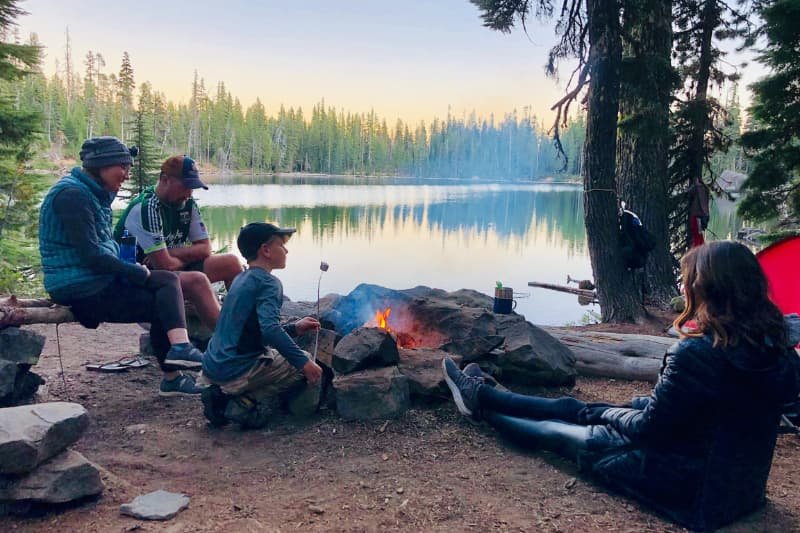
One of the key aspects of a successful camping trip is having a variety of activities and entertainment options available to keep everyone engaged and entertained.
Whether it’s exploring nature, playing games, or relaxing by the campfire, there are plenty of budget-friendly options that families can enjoy during their camping trip.
Here are some ideas to consider:
- Outdoor games: Pack some frisbees, footballs, or other outdoor games that are easy to transport and don’t take up much space. These games can provide hours of entertainment and are a great way to bond with family members.
- Fishing tips: For families who enjoy fishing, consider borrowing gear from friends or renting it from a local shop. Make sure to research the fishing regulations in the area beforehand and obtain any necessary permits. Fishing can be a great way to spend time outdoors and potentially catch dinner for the family.
- Nature walks: Take a hike or nature walk around the campsite to explore the surroundings and learn about the local flora and fauna. This is a great way to get some exercise and appreciate the beauty of nature.
- Campfire activities: Don’t forget to pack some cards or board games that can be played around the campfire. This is a great way to wind down at the end of the day and enjoy some quality time with family members. Additionally, consider bringing some materials to make s’mores or other campfire treats.
Maintenance and Storage
Maintaining and storing camping gear is crucial for ensuring its longevity and usability.
After each camping trip, it is important to wash and check for any damage to the gear. Any damage should be repaired before storing the gear to avoid further damage.
It is also important to store the gear when it is clean and dry to avoid mold and mildew.
To store camping gear, it is best to use storage solutions that are specifically designed for camping gear. These solutions can include storage bags, containers, and racks.
It is important to store gear in a cool, dry place to avoid any damage from moisture or heat.
By properly maintaining and storing camping gear, families can ensure that their gear will last for many camping trips to come.
FAQs:
Are there any safety tips for camping with a family on a budget?
Camping with a family on a budget requires emergency preparedness, childproofing, and knowledge of first aid and fire safety. These are essential to ensure a safe and enjoyable experience. Think of them as a compass for a successful camping trip.
Can camping gear be rented instead of purchased to save money?
Renting camping gear can be a cost-effective option for those who want to save money. However, purchasing gear during seasonal sales or buying used equipment can also be budget-friendly options for those who plan to camp frequently.
How can families with young children make camping more enjoyable for everyone?
Camping with picky eaters and entertaining kids while camping can be challenging. Bring familiar snacks and plan kid-friendly activities. Nature walks, treasure hunts and storytelling around the campfire are great options.
What are some budget-friendly options for camping in popular tourist destinations?
For budget-friendly camping in popular tourist destinations, consider DIY camping meals and alternative accommodations such as camping on public lands or staying in hostels. Research park fees and book in advance for the best deals.
Are there any tips for finding free or low-cost campsites?
National Parks offer affordable camping options, while community resources such as public lands provide opportunities for boondocking and dispersed camping. Researching and planning ahead can help find low-cost or free campsites for budget-friendly camping.

